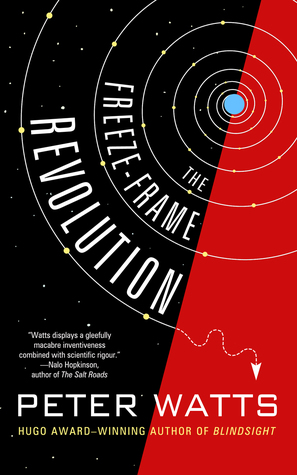Review: Peter Watts’s “The Freeze-Frame Revolution”
by Miles Raymer
I’ll be the first to admit that Peter Watts’s The Freeze-Frame Revolution might be a better book than I’m willing to give it credit for. It was nice to take another trip into the mind-bending ideas and dark humor for which Watts is rightly loved, but I found myself unable to sink into this novella in a way that satisfied. It also didn’t help that I failed to realize that Freeze-Frame is part of a series until I was already most of the way through. Had I familiarized myself with the Sunflower Cycle beforehand, I may have had a better experience.
Freeze-Frame is about a group of humans––called ‘spores––and an AI that make up the crew of the Eriophora, an asteroid-turned-spaceship that spirals around the Milky Way creating jump gates. These gates will allow future generations of humans (or anything else) to cover great distances using faster-than-light (FTL) travel, paving the way for the colonization of significant portions of the galaxy. But for the Eriophora and its crew, it’s a painfully slow journey:
Never for us, the luxury of FTL. The gods and gremlins who come after might hop between stars in an instant––but whether we’re bound for a single gate or a whole nest, we crawl. (140, emphasis his)
The ‘spores spend most of their time––years, decades, centuries, millennia––asleep in “crypts” that suspend their aging process. This juxtaposition between real and subjective time is a clever conceit, one that Watts uses effectively in the book’s opening lines:
Back when we first shipped out, I played this game with myself. Every time I thawed, I’d tally up the length of our journey so far…Oh look: all the way back to the Industrial Revolution in the time it took us to reach our first build. Two builds took us to the Golden Age of Islam, seven to the Shang Dynasty. I guess it was my way of trying to keep some kind of connection, to measure this most immortal of endeavors on a scale that meat could feel in the gut. (11)
Chimp, the onboard AI, pilots and maintains the Eriophora during the long spans between gate builds, and even executes many of the builds solo, but has the option to wake a group of ‘spores should a particularly difficult or uncertain situation present itself:
The only reason Eri shipped out with meat on board in the first place was for those times the Chimp didn’t feel up to managing a build on his own, when he needed some of that organic human insight to get him past the unknown variables and halting states. (46)
Apparently, the engineers that created Chimp “baked him stupid” to achieve “mission stability over deep time,” which is why he needs “organic human insight” to help him through challenging times (50). This relatively unconvincing scenario acts as a cover for Watts’s decision to derive drama from the tension between Chimp and the ‘spores. Here we find what is perhaps Freeze-Frame‘s most significant weakness: its plot hinges on a conflict that feels conventional and drab. As the title suggests, Watts pursues a revolutionary narrative that, while unconventional in some ways, doesn’t hold a candle to the innovative approach he took to the first contact narrative in Blindsight.
The other downfall of this book is its obvious paucity of characterization. Bland characters can sometimes be acceptable in hard sci-fi if the rest of the story is good enough, but Freeze-Frame doesn’t make the grade. Watts leans too heavily on a few semi-innovative core ideas and abstruse technological tangents, completely failing to make his protagonist or any of the other characters feel real or meaningful. The book grapples unsuccessfully with an ironclad law of fiction: If the reader doesn’t care about the characters, nothing else matters. So, despite an intriguing reveal in the last chapter and a fun “secret” message written in red letters throughout the text, Freeze-Frame left me feeling empty.
Given that this is the second time I’ve been tough on Watts for a book that didn’t feel worthy of his obvious talent, I’ll close with some words of praise. Blindsight is still one of my favorite sci-fi novels of all time. I’ve recommended it to countless friends over the last few years, and often bring up ideas from the novel when discussing psychology, consciousness, and cutting-edge depictions of alien beings. It’s also clear to anyone who reads Watts that he possesses a singular and deep intelligence, one we normal humans should be happy to have around. The fact that The Freeze-Frame Revolution didn’t work for me doesn’t change any of that.
Rating: 5/10
